Davao region remains African Swine Fever-free, an agriculture official said.
Dr. Armie Capuyan, the focal person for ASF at Department of Agriculture XI, junked reports that ASF has already affected – and killed – a hundred of hogs in the region.
“We would like to clarify the report from a national news outfit regarding the death of 100 hogs in Davao City that it was already verified by the City Veterinarian’s Office,” said Capuyan, a veterinarian.
“It could not be linked to ASF.”
Capuyan said the DA and CVO already met with the small hog-raisers association involved in the report for an investigation.
“There are no reported recent mortality,” said Capuyan adding that the reported 100 deaths is within a period of eight months.
“There is no truth to the news and we don’t want people to panic,” Capuyan added.
She also explained that the death of the hogs are not disease-related.
“As per the interview of small hog raisers during the investigation, it was found out that the cause of the death of the hogs is heat stroke and other factors during transport of hogs,” Capuyan said.
She added that in the region, the agency is strengthening its surveillance, quarantine, and cooperation with other agencies and stakeholders.
“We want to intensify our steps in the region on the information dissemination, surveillance, and quarantine especially on the Local Government Unit level,” the DA official said.
The veterinarian further reminded the hog-raisers to take preventive measures against ASF to maintain the ASF-free status of the region.
“Hog raisers should avoid swill-feeding. They should also intensify their bio-security measures even if they are just backyard raisers,” Capuyan said.
She added that raisers should always maintain cleanliness in the hog cages.
“Also, if they observe some symptoms of ASF among their swine, they should always immediately report it to us so that we can investigate and get sample to confirm the diseases that might have been inflicted to the swine. Let’s not jump to conclusions because even us the veterinarians, we have still have to get laboratory examinations to confirm one disease,” she said.

